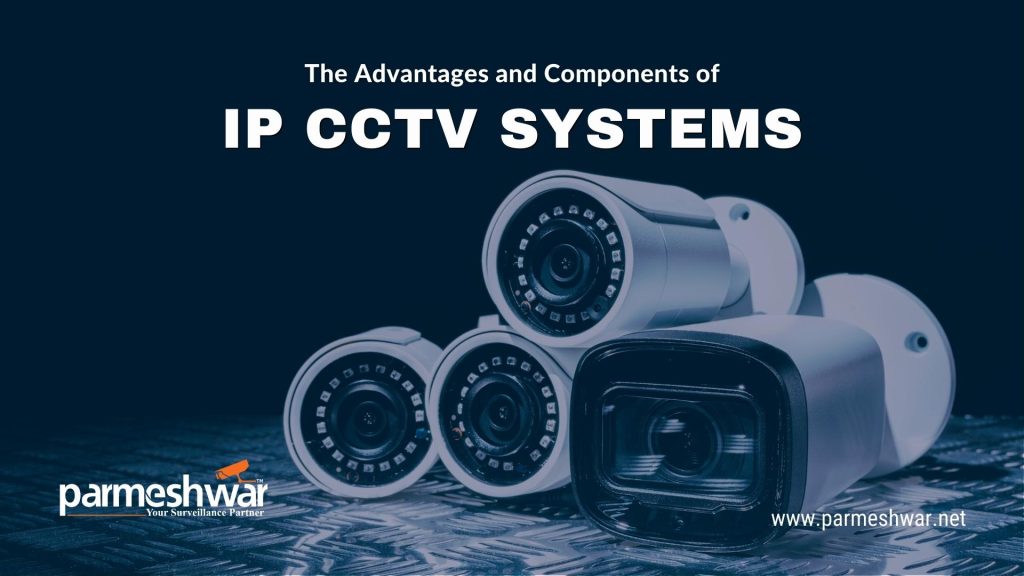
The Advantages and Components of IP CCTV Systems
Introduction:
IP (Internet Protocol) CCTV camera system is a type of closed-circuit television (CCTV) system that uses internet protocol (IP) to transmit video data over a network. This allows the camera system to transmit video in digital form, rather than using analog signals as in traditional CCTV systems.
IP CCTV camera systems can be used for a variety of applications, including surveillance, security, and monitoring. They are often used in homes, businesses, and public spaces to provide a record of activity and to deter crime.
IP CCTV camera systems typically consist of a number of cameras that are connected to a network and a digital video recorder (DVR) or network video recorder (NVR) that stores the recorded video. The cameras can be connected to the network using Ethernet cables or wirelessly using Wi-Fi. The video can be viewed and controlled remotely using a computer, smartphone, or other device with internet access.
Benefits of IP CCTV Systems:
Higher resolution and image quality: IP CCTV systems offer higher resolution and better image quality than traditional analog CCTV systems, as they use digital technology to transmit the video footage.
Flexibility:
IP CCTV systems allow users to access and view the video footage from any device with network access, such as a computer, smartphone, or tablet.
Audio and data transmission:
In addition to video, IP CCTV systems can transmit audio and data, which can be useful for applications such as remote surveillance or triggering alarms.
Ease of installation and maintenance:
IP CCTV systems do not require specialized wiring or cables, making them easier to install and maintain than traditional analog systems.
Scalability:
IP CCTV systems are easily scalable, as additional cameras can be added to the network as needed.
Remote access:
IP CCTV systems can be accessed remotely over the Internet, allowing users to view the video footage from anywhere.
Integration with other systems:
IP CCTV systems can be integrated with other systems, such as access control systems, alarms, and building management systems.
Components of an IP CCTV System:
An IP CCTV system consists of the following components:
Video cameras:
These capture the video footage and can include dome cameras, bullet cameras, and PTZ (pan-tilt-zoom) cameras. Some cameras have additional features such as night vision or motion detection.
Network video recorder (NVR):
This device stores the video footage captured by the cameras and includes a hard drive and processor for managing the data.
Network switch:
This connects the cameras to the network and allows them to communicate with the NVR and other devices.
Ethernet cables:
These connect the cameras to the network switch.
Power over Ethernet (PoE) injector or switch:
This provides power to the cameras over the Ethernet cable, eliminating the need for separate power cables.
Software:
This is used to manage and view the video footage and can be installed on a computer or accessed through a web browser.
Monitors:
These display the video footage in real-time and can be connected to the NVR or a computer running the software.
Keyboard and mouse:
These are used to control the NVR and other devices in the system.
Hard drive:
This stores the video footage on the NVR and can be a standalone hard drive or part of the NVR itself.
Router:
This connects the NVR and other devices in the system to the Internet, allowing for remote access to the video footage.
Conclusion :
IP CCTV systems offer a number of advantages over traditional analog CCTV systems, including higher resolution and image quality, flexibility, audio and data transmission, ease of installation and maintenance, scalability, remote access, and integration with other systems. These benefits, combined with the various components that make up an IP CCTV system, make it a powerful tool for security and surveillance applications.
Share on Social Media
Checkout Video Tutorial
Share On Social Media
We Provide the Best Service in Industry
This is what our customer say…Check out yourself what they have experience.